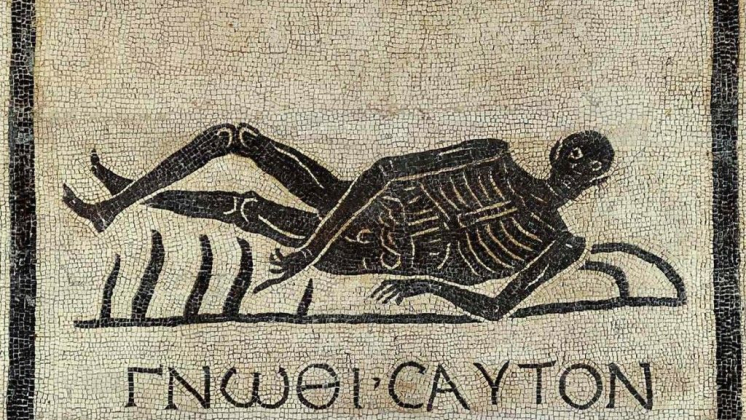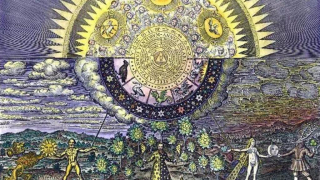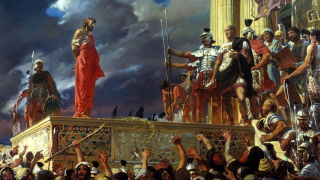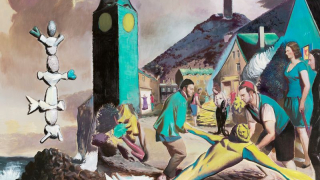Escaping Gnosticism
In some foregoing essays we have seen how New England fell into the pit of Gnosticism and how she has dragged the other States down into it with her. This was made possible and remains the current status of things because of a fall into spiritual delusion, first by New England and then by all the other regions of the American Union whom she forced to drink of the cup of her madness after the War to Prevent Southern Independence. To change this political state of affairs, then, the religious foundation on which it rests needs a thorough-going renovation. We will look to that momentarily, but first let us summarize how the States came to their present woeful condition.
Prof Richard Weaver says at the end of his important essay ‘Two Diarists’ about the prototypical New England Puritan Cotton Mather and the representative character for the South William Byrd II,
‘The Puritans recovered one strand of the Hebraic spirit, but they added a special conviction about what was material, which narrowed and one may say fairly warped their view of what was before their eyes. The religious tradition and the social class that Byrd represented, on the other hand, had little of the spirit of condemnation and was far more receptive to the Graeco-Roman part of the Judaeo-Christian heritage. This did not begin by rejecting the material order, and it balanced the metaphysical idea of becoming with that of being. Moreover, it contained another idea very dear to the classical mind, that of measure. The maxim for human life must be “nothing too much,” and to imagine that one can think as a god is, in the wisdom of antiquity, madness. Byrd’s adjustment to the world is a display of this ideal; it is an acceptance qualified by distance and measure, in response to a sense of man’s dual nature. Egotism is held in restraint by an awareness of other things. Hence his poise, his urbanity, his willingness to let live. He moved in a world which appreciated these virtues and rewarded them. But when they met Puritanism in a wider struggle, it developed that the Puritan temper possessed a power of aggression which classical balance and tolerance could not withstand’ (In Defense of Tradition, ed. Ted Smith III, Liberty Fund, Indianapolis, Ind., 2000, pgs. 747-8).
One of the key differences shown here between the two peoples, North and South, is that of humility. The South, in accepting the boundaries placed on her thought and action by the classical Greek and Roman maxims, was able to steer a safer course through the temptations thrown up by Promethean Modernity. The North on the other hand rejected all such restraints on her reasoning, which led her to deify herself and to invest herself with the mission of redeeming mankind from all his errors. Richard Hooker, whom we also heard from earlier in this series of essays, illustrates the danger of rejecting humility and tradition in favor of what one perceives as special revelations in his book Of the Laws of Ecclesiastical Polity. There, he examines this selfsame Puritan spirit that has spread so much moral and physical destruction across the States and the world. This is how it began its development in earnest:
‘But forasmuch as against all these and the like difficulties your answer is, that we ought to search what things are consonant to God’s will, not which be most for our own ease; and therefore that your discipline being (for such is your error) the absolute commandment of Almighty God, it must be received although the world by receiving it should be clean turned upside down; herein lieth the greatest danger of all. For whereas the name of divine authority is used to countenance these things, which are not the commandments of God, but your own erroneous collections; on him ye must father whatsoever ye shall afterwards be led, either to do in withstanding the adversaries of your cause, or to think in maintenance of your doings. And what this may be, God doth know. In such kinds of error the mind once imagining itself to seek the execution of God’s will, laboureth forthwith to remove both things and persons which any way hinder it from taking place; and in such cases if any strange or new thing seem requisite to be done, a strange and new opinion concerning the lawfulness thereof is withal received and broached under countenance of divine authority.’
--Preface, Ch. viii. 5, https://oll.libertyfund.org/titles/hooker-the-works-of-richard-hooker-vol-1
‘Nothing more clear unto their seeming, than that a new Jerusalem being often spoken of in Scripture, they undoubtedly were themselves that new Jerusalem, and the old did by way of a certain figurative resemblance signify what they should both be and do. Here they drew in a sea of matter, by applying all things unto their own company, which are any where spoken concerning divine favours and benefits bestowed upon the old commonwealth of Israel: concluding that as Israel was delivered out of Egypt, so they spiritually out of the Egypt of this world’s servile thraldom unto sin and superstition; as Israel was to root out the idolatrous nations, and to plant instead of them a people which feared God; so the same Lord’s good will and pleasure was now, that these new Israelites should, under the conduct of other Josuas, Samsons, and Gedeons, perform a work no less miraculous in casting out violently the wicked from the earth, and establishing the kingdom of Christ with perfect liberty . . .’
--Preface, Ch. viii. 11.
‘For my purpose herein is to shew, that when the minds of men are once erroneously persuaded that it is the will of God to have those things done which they fancy, their opinions are as thorns in their sides, never suffering them to take rest till they have brought their speculations into practice. The lets and impediments of which practice their restless desire and study to remove leadeth them every day forth by the hand into other more dangerous opinions, sometimes quite and clean contrary to their first pretended meanings: so as what will grow out of such errors as go masked under the cloak of divine authority, impossible it is that ever the wit of man should imagine, till time have brought forth the fruits of them: for which cause it behoveth wisdom to fear the sequels thereof, even beyond all apparent cause of fear.’
--Preface, Ch. viii. 12.
There must be a brake on human reasoning in some form, or this kind of hubris will be the result. It begins innocently enough, with an exodus from established society into the wilderness, but ends with violent excess and the overturning of all moral norms - slaying Native Americans and Southerners, abortion, eugenics, nuclear bombs, the leveling of Dresden and Pyongyang, transgenderism - and all done supposedly for the sake of ‘casting out the wicked from the earth’ and establishing the New Jerusalem.
It is not enough simply to have the Bible. Both New England and the South had the Holy Scriptures, but each created an entirely different culture from the same book. It is not sola Scriptura, the Bible alone, that is decisive; it is the interpretive tradition with which one reads the Holy Scriptures that matters, that helps one achieve the special gift of discrimination of what things are true and what things false.
And it is here that an unlikely figure (in the minds of the Yankees and of Dixie’s folk, who both for many years underrated the abilities of Africans) emerges to teach both peoples about this virtue: St Moses the Black of Ethiopia (+405). St John Cassian the Roman (+435) recounts the teachings of St Moses on acquiring discrimination in a letter he wrote to Abba Leontios. They are a mirror for both North and South, in which the habits of both and their respective consequences are clearly seen. This being the case, they are words of life and death. If they follow them, they will be free of the curse of Gnosticism that afflicts both of them at present. If they do not, they will descend completely into the chaos of hell.
St Moses says,
‘ . . . the gift of discrimination is nothing worldly or insignificant. It is the greatest gift of God's grace. A monk must seek this gift with all his strength and diligence, and acquire the ability to discriminate between the spirits that enter him and to assess them accurately. Otherwise he will not only fall into the foulest pits of wickedness as he wanders about in the dark, but even stumble when his path is smooth and straight.
'I remember how in my youth, when I was in the Thebaid, where the blessed Antony used to live, some elders came to see him, to enquire with him into the question of perfection in virtue. They asked him; "Which is the greatest of all virtues - we mean the virtue capable of keeping a monk from being harmed by the nets of the devil and his deceit?" Each one then gave his opinion according to his understanding. . . .
'Last of all the blessed Antony gave his reply: "All that you have said is both necessary and helpful for those who are searching for God and wish to come to Him. But we cannot award the first place to any of these virtues; for there are many among us who have endured fasting and vigils, or have withdrawn into the desert, or have practiced poverty to such an extent that they have not left themselves enough for their daily sustenance, or have performed acts of compassion so generously that they no longer have anything to give; and yet these same monks, having done all this, have nevertheless fallen away miserably from virtue and slipped into vice.
' "What was it, then, that made them stray from the straight path? In my opinion it was simply that they did not possess the grace of discrimination; for it is this virtue that teaches a man to walk along the royal road, swerving neither to the right through immoderate self-control, nor to the left through indifference and laxity. Discrimination is a kind of eye and lantern of the soul, as is said in the gospel passage: "The light of the body is the eye; if therefore your eye is pure, your whole body will be full of light. But if your eye is evil, your whole body will be full of darkness' (Matt. 6:22-3). And this is just what we find; for the power of discrimination, scrutinizing all the thoughts and actions of a man, distinguishes and sets aside everything that is base and not pleasing to God, and keeps him free from delusion.” ’
--pgs. 98-9, The Philokalia, Vol. One, https://www.holybooks.com/wp-content/uploads/Philokalia.pdf
The figure of the Puritan/Yankee begins to present itself just here. St Moses then proceeds to give specific examples of what living without discrimination looks like, and in them the outlines of the Yankee are further clarified. He says,
‘ . . . in order to confirm what St Antony said by means of fresh examples from our own times, we should recall Abba Hiron and how a few days ago, as we ourselves saw, he was thrown down from the height of the ascetic state to the depths of death by the deception of the devil. We know how he spent some fifty years in the nearby desert, following a life of great severity and the strictest self-control, seeking out and living in parts of the desert wilder than those inhabited by any of the other monks there. This same man cast all the fathers and brothers of the nearby desert into inconsolable grief because, after so many labors and struggles, he was deceived by the devil and suffered such a disastrous fall. This would not have happened to him had he been armed with the virtue of discrimination, which would have taught him to trust, not his own judgment, but rather the advice of his fathers and brethren. Following his own judgment he fasted and isolated himself to such a degree that he did not even come to church for the Holy Pascha, lest by meeting the fathers and brethren and feeding with them he would be obliged to eat lentils or whatever else was brought to the table, thereby appearing to fall short of the target which he had set himself.
'He had already for long been deceived in this way by his own willfulness when, coming upon an angel of Satan, he bowed before him as if he were an angel of light. The angel commanded him to hurl himself, around midnight, into a very deep well so that he might then know by experience, because of his great virtue and ascetic efforts, that he would never again be subject to any danger. His darkened mind failed to discern who was suggesting this to him, and he hurled himself into the well during the night. Soon afterwards the brethren, discovering what had happened, were only just able to pull him up half dead. He lived for two more days and died on the third, plunging his brethren and the priest Paphnoutios into great grief. The latter, moved by feelings of compassion and remembering Hiron's numerous labors and the many years during which he had persevered in the desert, mentioned his name in the oblation for the dead so that he should not be numbered among those who have taken their own lives.’
--pgs. 100-1
'What am I to say about another monk whose name I do not wish to mention because he is still alive? He frequently entertained a demon as if he were an angel and received revelations from him, often seeing what looked like the light of a lamp in his cell. Later, he was ordered by this demon to offer his son as a sacrifice to God - his son was staying with him in the monastery - on the grounds that he would as a result be deemed worthy of the honor accorded to the patriarch Abraham. He was so led astray by the demon's advice that he would have carried out the sacrifice of his son, had the latter not seen him, contrary to his normal practice, sharpening a knife and preparing the bonds with which he was going to tie him up like a burnt offering. This enabled the son to make his escape.’
--p. 102
Just like the New England Puritan, these men were very strict with themselves, practicing many virtues, but because they lacked discrimination, they came to an evil end. But there is no reason why New England or the South must meet such an end. St Moses goes on to relate how they and the rest of the States can avoid that:
Abba Moses then said: 'True discrimination comes to us only as a result of true humility, and this in turn is shown by our revealing to our spiritual fathers not only what we do but also what we think, by never trusting our own thoughts, and by following in all things the words of our elders, regarding as good what they have judged to be so. In this way not only does the monk remain unharmed through true discrimination and by following the correct path, but he is also kept safe from all the snares of the devil. It is impossible for anyone who orders his life on the basis of the judgment and knowledge of the spiritually mature to fall because of the wiles of the demons.’
--p. 103
'From what Abba Serapion said, we can learn that we shall be granted the gift of true discrimination when we trust, no longer in the judgments of our own mind, but in the teaching and rule of our fathers. The devil brings the monk to the brink of destruction more effectively through persuading him to disregard the admonitions of the fathers and follow his own judgment and desire, than he does through any other fault. We should learn from examples provided by human arts and sciences. If we cannot accomplish anything in them by ourselves - in spite of the fact that they deal with things we can touch with our hands, see with our eyes and hear with our ears - but still need someone who will instruct us well and guide us, how can it be anything but foolish to think that the spiritual art, the most difficult of all the arts, has no need of a teacher? It is an invisible, hidden art which is understood only through purity of heart, and failure in it brings, not temporary loss, but the soul's destruction and eternal death.'
--p. 104
‘Many texts from the divine Scriptures make it clear that the fathers did not say these things according to their own-lights, but were inspired by God Himself and by the Scriptures to hand down to their successors the tradition of asking advice from those who had traveled far along the spiritual path. This is borne out especially by the story of the holy Samuel, who from infancy was dedicated by his mother to God and was granted communion with Him. He still did not trust his own thoughts, and in spite of having been called three times by God, he went to the elder, Eli, and was instructed and guided by him about how he should answer God (cf. 1 Sam. 3:9-10). Although God called him personally, none the less He wanted Samuel to receive the guidance and discipline of the elder, so that by means of this example we too might be led towards humility.
'When Christ Himself spoke to Paul and called him, He could have opened his eyes at once and made known to him the way of perfection; instead He sent him to Ananias and told him to learn from him the way of truth, saying: "Arise and go into the city, and there you will be told what you must do" (Acts 9:6). In this manner He teaches us to be guided by those who are advanced on the way, so that the vision rightly given to Paul should not be wrongly interpreted; otherwise it might lead later generations presumptuously to suppose that each individual must be initiated into the truth directly by God, as Paul was, and not by the fathers.
‘That this is the correct interpretation of these incidents can be seen not only from what is said here, but also from St Paul's own actions. He writes that he went up to Jerusalem to see Peter and James, and "laid before them the gospel I preach ... in case I was running or had run in vain" (Gal. 2: 2); and he did this even though the grace of the Holy Spirit was already with him, as can be seen from the miracles which he performed. Who, then, can be so proud and boastful as to be satisfied with his own judgment or opinion, when St Paul himself admits that he needs the advice of those who were apostles before him? All this shows with complete clarity that the Lord reveals the way of perfection only to those guided to it by their spiritual fathers. This accords with what He Himself has said through the Prophet: "Ask your father, and he will show you; your elders, and they will tell you" (Deut. 32:7).
'We should therefore make every effort to acquire for ourselves that gift of discrimination which is able to keep us from excess in either direction. For, as the fathers have said, all extremes are equally harmful.’
--pgs. 106-8
Richard Hooker in Of the Laws of Ecclesiastical Polity shows very plainly that the Puritans/Yankees rejected the guidance of anyone in their interpretation of Holy Scripture and in their manner of living, swinging wildly from one extreme to the other, from chastity and fasting to polygamy and gorging. Likewise in Prof Weaver’s ‘Two Diarists’ the deceptive visions of Cotton Mather, given to him by the demons, are revealed. All this is evidence of a lack of discrimination.
The South, while she did not have the full Orthodox Tradition of the Holy Fathers to guard her soul, nevertheless did place herself within the protecting bounds of a particular tradition, in large measure consisting of the hard-won wisdom of the ancient Greeks and Romans. In doing so, she was able to avoid the extremes that the Yanks practiced. Dr James Kibler, Jr, speaks of this tradition throughout his book The Classical Origins of Southern Literature (Abbeville Institute Press, McClellanville, South Car., 2017). The following are a few passages that bear especially on what we have been discussing:
‘ΓΝΩΘΙ ΣΑΥΤΟΝ (in Latin, Gnothi Sauton) was written above the Oracle at Delphi. The Greek translates, Know your place, that is, know your place before God. Man is the finite created, the creature, not the Creator, who is infinite. Hubris is the opposite in putting oneself above God or presuming to ascend His throne. The beginning of Delphic knowledge, the keystone of Classical wisdom, is thus Gnothi Sauton. It is not an overstatement to say that I do not know a single significant Southern writer in the four centuries of Southern literature who does not subscribe to that belief. Remarkably, in our age of Science, Secular Humanist thought, and manifestos of Scientific Humanism, those Southern writers even include the recent ones. As it was for the Greek and Roman poets and dramatists, so it is a bedrock Southern belief—one of the firm bases on which both Southern culture and Southern literature have been built’ (p. 82).
‘While on the subject of the Southern admiration of Horace, it must be noted that a key consideration of Southern literature through the ages has been the Horatian golden mean and the balance and wholeness of character that comes with it. Inscribed on the Temple of Apollo at Delphi were the words Μχδεύ Χίαν, “Nothing to excess.” Like ΓΝΩΘΙ ΣΑΥΤΟΝ, Μχδεύ Χίαν involved limits. The roots of Southern literature are seen in these two foundation stones of Southern Classicism. As we saw in the previous chapter, the virtue moderation was central to the Southern concept of the gentleman’ (pgs. 122-3).
‘The Golden Age theory was not a new thing. The concept was rooted in the beginnings of the Classical view of history. Like Simms and the other Southern writers of the continuum, Poe had that Classical view. The Golden Age resided in some Eldorado of the past. The deeper the past, the more Golden. The present shows degeneration; the future will show even more. The war in the South may be said to have only entrenched and intensified the antebellum Southerner’s Classical understanding. The destruction and debasement of many things of spirit, balance, order, and beauty in the post-bellum era only served to prove the wisdom and validity of the Southerner’s Greek and Roman literary fathers. For many Southerners, the Greek and Roman writers proved even wiser in the face of buoyant American optimism and belief in the doctrine of ultimate and unlimited material progress—a belief that now had come to have the status of a secular religion in much of the nation. In mid-twentieth century America, Flannery O’Connor would call these secular zealots “the heathenry” ’ (pgs. 146-7).
‘The Southerner’s Greek and Roman literary fathers’ - Cicero, Xenophon, Horace, et al., along with some of the Fathers of the Orthodox Church like St Basil the Great and St Gregory the Theologian - these are the elders and fathers who helped the South withstand for a time the furious onslaught of Modernity, by inculcating virtues like moderation and humility, protecting her from the corrosive effects of New England Gnosticism, for her cousins to the north had completely cut themselves off from any tradition but their own inner voices and visions. But when the latter invaded and turned Dixie’s cultural world ‘clean upside down’, to use Hooker’s words, then through the breaches in the walls came rushing in all the madness of life without restraint. The safeguards have been ripped up in most (but not all) places in the South, making ample room for Yankee self-direction in religion and morals, a debased education focused only on how to get a high paying job, etc.
But the good news is that an escape from this Gnostic inferno is possible. All that is necessary is for the American Exceptionalist of whatever kind - leftist Yankee human rights advocate working for an NGO or rightist Evangelical neocon from the South - to embrace the teachings of St Moses the Black: distrust our own thoughts and feelings, cultivate humility, submit to the teachings of the holy mothers and fathers of the Church, regain discrimination.
And now that the revolutionary New England Gnostic spirit is again reaching a fever pitch with the Black Lives Matter protests, the necessity of kneeling in humility before St Moses (not George Floyd) is more urgent than ever.














